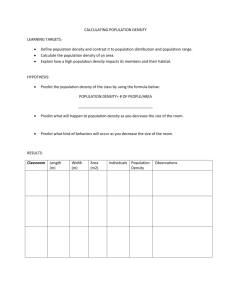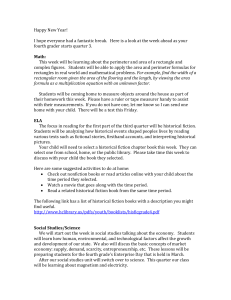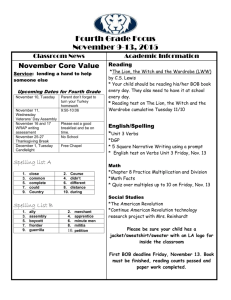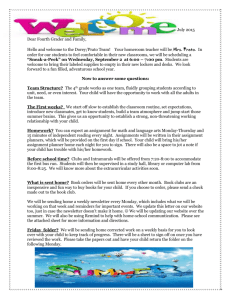2015-2016 BTSN PowerPoint - Montgomery Township Schools
advertisement
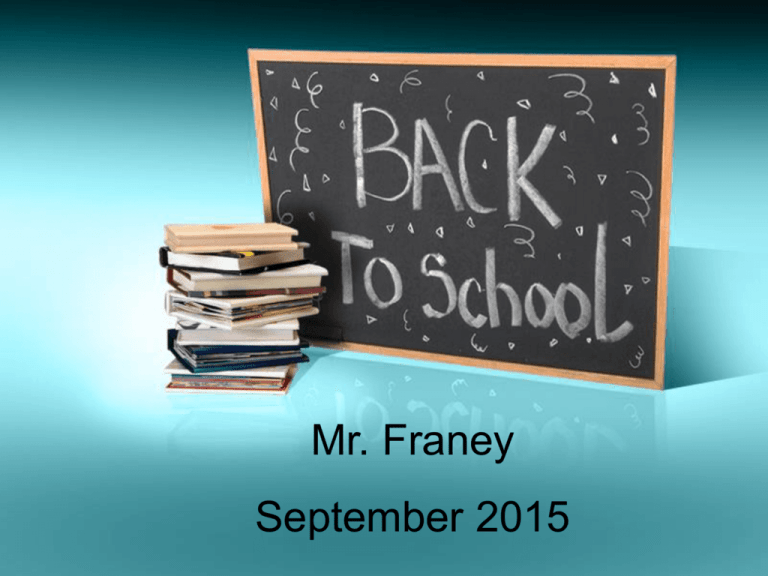
Mr. Franey September 2015 Introduction • A little bit about myself – 19th year teaching in Montgomery – Undergraduate degree from Rutgers College – Graduate degrees from Rutgers Grad. School of Ed. – Married with a daughter who is a 4th grader in the Bridgewater School District Tonight’s Agenda • • • • • • • • Curriculum Overview (It’s quick. I promise!) A Typical School Day in Your Child’s Life Responsive Classroom Class Rules Homework Report Cards Testing Communication Fourth Grade Reading • Reader’s Workshop Format • Mini-lesson (Whole Class Direct Instruction) • Independent Reading • Individual Reading Conferences • Reading Partnerships • Guided Reading • Interactive Read-Alouds • Partnership with Teachers College Fourth Grade Reading Units • Interpreting Characters: The Heart of the Story • Reading the Weather, Reading the World (Nonfiction) • Interpretation Book Clubs • Historical Fiction Book Clubs • Reading History: The American Revolution • Nonfiction Book Clubs: Author Studies Fourth Grade Writing • Focus on writing instruction at all grade levels through Writer’s Workshop • Writer’s Workshop Daily Format • Mini-lesson (Whole Class Direct Instruction) • Independent Writing • Individual Writing Conferences • Strategy Groups • Share • Interactive Writing • Partnership with Teacher’s College Fourth Grade Writing Units • The Arc of Story (Realistic Fiction) • Boxes and Bullets: Personal and Persuasive Essays • The Literary Essay • The Craft of Fiction • Bringing History to Life (American Revolution) • Journalism Fourth Grade Language Arts Homework • Language Arts Homework will be assigned nightly to students • Homework may be related to reading OR writing • A specific task will accompany each night’s homework – i.e. Reading: Reading an article and responding in reading notebooks – i.e. Writing: Drafting multiple versions of thesis statements for a literary essay • There may be additional optional homework related to reading self-selected texts at home or practicing spelling activities • Spelling word lists/features will be given each week, but the majority of spelling practice will take place in the classroom K-4 Mathematics Math in Focus Math Workshop Approach Mini-lesson • Whole Class Direct Instruction using a Concrete-PictorialAbstract progression. • Includes opportunities for students to discuss concepts and big ideas in each unit. Practice • Games, Activities, & Written Practice Small Group Instruction Infused Technology Goal Based Fact Fluency Practice Problem Solving Experiences Tonight’s Year at a Glance document will provide more information about grade level topics and a ThinkCentral e-blast with information about online textbook access is coming soon. K-4 Science and Social Studies Students will learn about their communities and the world around them through: Social Studies •Culture and Diversity •American Colonial Period •American Revolution Science •Scientific investigations in Life, Earth, and Physical Sciences •Developing Science Process Skills, such as Observation, Hypothesis, Scientific Drawing, Measurement and Collecting Data •Engineering projects embedded within units of study At all grade levels, there is an increased focus on non-fiction and informational texts in both Science and Social Studies. Technology • • • • • • • Chromebooks (7) Google Drive Student Accounts Open Computer Lab Time www.Xtramath.org (helps students master basic facts) www.thelearningodyssey.com (Math & Reading) www.raz-kids.com (Reading) www-k6.thinkcentral.com (Math) A Typical Day 9:20-9:45 Morning Work 9:45-10:00 10:00-11:00 11:00-11:10 11:10-12:00 12:00-12:05 Morning Meeting Math Snack Writing Workshop 12:05-12:50 12:50-1:25 Energizer Reading Workshop Science or Social Studies 1:25-2:10 Lunch/Recess 2:10-2:50 3:05-3:45 Word Study & Read Aloud Special Responsive Classroom • • • • • • • • Based on the belief that the social curriculum is as important as the academic curriculum. To be successful academically and socially, children need a set of social skills: cooperation, assertion, responsibility, empathy, and self-control. Morning Meeting Hopes and Dreams Rule Creation Modeling of expected behavior Logical consequences for misbehavior You break it you fix it, Temporary loss of privilege, Take a break Homework • • • • • Establish good independent study & work habits, reinforce learning Should be able to be done relatively unassisted Expect between 30 to 40 minutes most nights split between math and literacy (this includes the 20 minutes of reading on reading nights) Homework assignment books Opportunity to make-up missed or forgotten homework. • I understand that our late dismissal time can make it difficult to finish homework on days when students have after school activities. If you could send me a note or a quick email when this happens I would appreciate. Online Report Cards • Three per year (December 23, late March, & June 21) • No letter grades, instead student understanding of content is graded as proficient, partially-proficient, or non-proficient. Standardized Testing • MAP – Reading & Math (Measure of Academic Progress) – Last 2 weeks in October • PARCC (Partnership for Assessment of Readiness for College and Careers) – One week, sometime between April 11 & May 11. – District PARCC info: http://www.mtsd.k12.nj.us/domain/1141 • NJASK – Science (NJ Assessment of Skills and Knowledge) – May 25th Band & Orchestra Lessons • Students will miss instruction when they leave for orchestra and band lessons. Twenty-one students leave in eleven different groups over four days each week. • Students are responsible for making up any work that they miss while at music lessons. I will do my best to help them during recess or other times that present themselves during the school day, but it is their responsibility to make up what they miss. Communication • E-mail – kfraney@mtsd.us (best bet) • e-mail reminders from me about important dates (tests, field trips, school events...) – I’ve sent a few emails using a distribution list I compiled from school records. If you haven’t received them, or want add or remove an address please send me an email. • My website: www.mtsd.k12.nj.us/Domain/500 • Parent Pick-up notes help me remember to send students to parent pick-up. • Parent-Teacher Conferences – November 19, 20, 23 & 24 Food in School/Class • Please send a healthy snack with your child.(our lunch is not until 1:30!) MANAGEMENT OF LIFE-THREATENING ALLERGIES IN SCHOOLS • All classrooms are nut-free (i.e. snacks consumed in the classroom must be free of peanuts, tree nuts and nut byproducts). Nut products may be kept in a student’s backpack/lunchbox for later consumption in the lunchroom only. • No outside food is permitted to be shared in the classroom (i.e. no food is permitted to be brought into the classroom to be shared for celebrations/birthdays). Room Parents • We currently have no volunteers to be room parents this year. If you’re interested in volunteering, please email me. Thank you! http://www.mtsd.k12.nj.us/Page/3508 Wish List • Tissues Questions Thank You for Coming Tonight!
